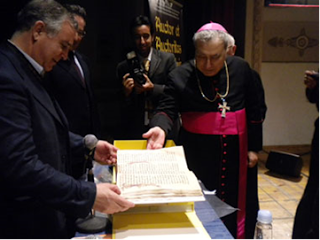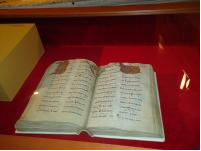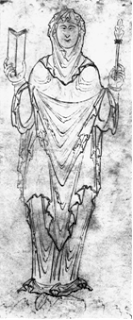Medieval History
Dr Rosalind Love writes:



What I tried to show atNaples ASNC , namely Pádraic Moran, now based in Galway . Glosses take us right to the heart of the way knowledge circulated and scholarly debate was conducted in the Middle Ages: will they be analysing our marginal jottings in 3010?
- Conference Report: Linguistic Encounters And Educational Practice
Razvan Stanciu, a PhD student in ASNC, writes: On 29 and 30 November, St John?s College was host to a symposium organised by the Department?s own Máire Ní Mhaonaigh and Michael Clarke of NUI Galway. They brought together six scholars of medieval...
- Letter To Demetrias (british Academy Post-docs Part Ii)
Following on from our news of Dr Paul Gazzoli's British Academy Post-doctoral Fellowship to work on the Life of Anskar, we also wish to congratulate another ASNC, Dr Alison Bonner, who has also been awarded a British Academy Post-doctoral Fellowship....
- Medieval French Specialist Working On New Edition Of The Consolation Of Philosophy
A University of Queensland researcher is continuing a life's passion, bringing medieval literary treasures to contemporary readers. Medieval French specialist Dr Keith Atkinson is in the process of editing the fourth in a series of Latin to French...
- St Gall Priscian Glosses
ST GALL PRISCIAN GLOSSES Rijcklof Hofman (transcription), Pádraic Moran (digital edition) http://www.stgallpriscian.ie/ St Gall MS 904 is a copy of Priscian's monumental Institutiones Grammaticae (Foundations of Grammar) written in 851. It contains...
- Making Sense: Constructing Meaning In Early English
MAKING SENSE: CONSTRUCTING MEANING IN EARLY ENGLISH edited by Antonette diPaolo Healey and Kevin Kiernan. Publications of the Dictionary of Old English 7 (Toronto: Pontifical Institute of Mediaeval Studies 2007). xii, 138 pages. ISBN 978-0-88844-907-8...
Medieval History
Author, authority and books in Benevento
Dr Rosalind Love writes:
Ten days ago I stepped off the crazy whirl of Cambridge Naples Benevento University of Suor Orsola Benincasa Naples Benevento Benevento Benevento Naples


After that excitement, it was down to business for the 200 of us attending the Congress, whose theme was ?Auctor et auctoritas?. I was there to represent a research project with which I?ve been involved since 2007, ?Boethius in Early Medieval Europe. Commentary on The Consolation of Philosophy from the 9th to the 11th centuries?, funded for five years by the Leverhulme Trust and headed by Professor Malcolm Godden, of the University of Oxford

'Philosophia', in the tenth-century Canterbury
copy of the Consolation in Trinity College, Cambridge
Our project focuses on the nearly 80 manuscripts of the text surviving from the period up to ca. 1100. Almost all of them preserve annotation, sometimes very dense, reflecting medieval readers? responses to every aspect of Boethius?s text, from his neo-platonic philosophy, his stories from Rome England
What I tried to show at
- Conference Report: Linguistic Encounters And Educational Practice
Razvan Stanciu, a PhD student in ASNC, writes: On 29 and 30 November, St John?s College was host to a symposium organised by the Department?s own Máire Ní Mhaonaigh and Michael Clarke of NUI Galway. They brought together six scholars of medieval...
- Letter To Demetrias (british Academy Post-docs Part Ii)
Following on from our news of Dr Paul Gazzoli's British Academy Post-doctoral Fellowship to work on the Life of Anskar, we also wish to congratulate another ASNC, Dr Alison Bonner, who has also been awarded a British Academy Post-doctoral Fellowship....
- Medieval French Specialist Working On New Edition Of The Consolation Of Philosophy
A University of Queensland researcher is continuing a life's passion, bringing medieval literary treasures to contemporary readers. Medieval French specialist Dr Keith Atkinson is in the process of editing the fourth in a series of Latin to French...
- St Gall Priscian Glosses
ST GALL PRISCIAN GLOSSES Rijcklof Hofman (transcription), Pádraic Moran (digital edition) http://www.stgallpriscian.ie/ St Gall MS 904 is a copy of Priscian's monumental Institutiones Grammaticae (Foundations of Grammar) written in 851. It contains...
- Making Sense: Constructing Meaning In Early English
MAKING SENSE: CONSTRUCTING MEANING IN EARLY ENGLISH edited by Antonette diPaolo Healey and Kevin Kiernan. Publications of the Dictionary of Old English 7 (Toronto: Pontifical Institute of Mediaeval Studies 2007). xii, 138 pages. ISBN 978-0-88844-907-8...
